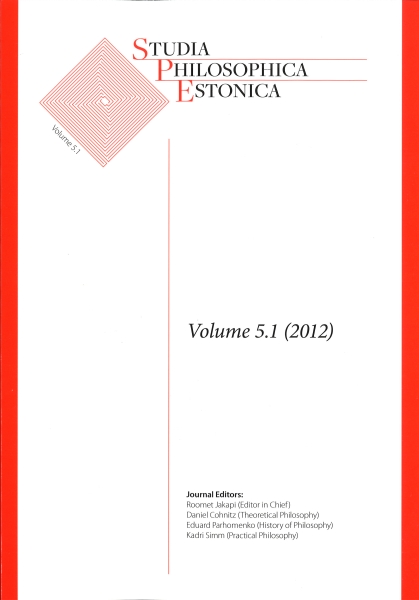Two Millian Arguments: Using Helen Longino's Approach to Solve the Problems Philip Kitcher Targeted with His Argument on Freedom of Inquiry
DOI:
https://doi.org/10.12697/spe.2012.5.1.03Keywords:
freedom of speech, Mill, Kitcher, Longino, social consequences of researchAbstract
Philip Kitcher argued that the freedom to pursue one's version of the good life is the main aim of Mill's argument for freedom of expression. According to Kitcher, in certain scientific fields, political and epistemological asymmetries bias research toward conclusions that threaten this most important freedom of underprivileged groups. Accordingly, Kitcher claimed that there are Millian grounds for limiting freedom of inquiry in these fields to protect the freedom of the underprivileged. I explore Kitcher's argument in light of the interpretation Helen Longino gave to Mill's argument. She argued that free critical dialogue in the community allows bias to be overcome, through intersubjective criticism of hypotheses and the background assumptions that frame them. I suggest that Longino's approach allows for the identification of the fundamental problems of the research programs Kitcher targeted, and for the rejection of their claims to knowledge. Thus it is possible to address Kitcher's problem without limiting freedom of speech.
Downloads
References
Biddle, J. B. (2009). Advocates or unencumbered selves? On the role of Mill’s political liberalism in Longino’s contextual empirism, Philosophy of Science 76: 612-623.
Brown, J. R. (2004). Science, Truth, and Democracy by Philip Kitcher, The Journal of Philosophy 101: 599-606.
Culp, S. (1995). Objectivity in experimental inquiry: Breaking data-technique circles, Philosophy of Science 62: 430-450.
Feyerabend, P. K. (1991). Against Method, Verso, London.
Feyerabend,P. K.(1999). How to defend society again stscience, in J. Preston (ed.), P. K. Feyerabend. Knowledge, Science and Relativism: Philosophical Papers, Cambridge University Press, Cambridge, pp. 181-191.
Goldman, A. I. (1999). Knowledge in a Social World, Clarendon Press, Oxford.
Howard, D. (2009). Better red than dead – putting an end to the social irrelevance of postwar philosophy of science, Science & Education 18:199-220.
Kitcher, P. (1985). Vaulting Ambition: Sociobiology and the Quest for Human Nature, The MIT Press, Cambridge, MA.
Kitcher, P. (1997). An argument about free inquiry, Nous 31: 279-306.
Kitcher, P. (2001). Science, Truth, and Democracy, Oxford University Press, New York.
Kitcher, P. (2002). The third way: Reflections on Helen Longino’s The Fate of Knowledge, Philosophy of Science 69: 549-559.
Kitcher, P. (2007). Reply to Talisse and Aikin, Journal of Social Philosophy 38: 666-669.
Kitcher, P. (2011). Science in a Democratic Society, Prometheus Books, New York.
Kourany, J. A. (2010). Philosophy of Science after Feminism, Oxford University Press, Oxford.
Lloyd, E. A. (1997). Feyerabend, Mill, and pluralism, Philosophy of Science 64: S396-S407. Supplement. Proceedings of the 1996 Biennial Meetings of the Philosophy of Science Association. Part II: Symposia Papers.
Longino, H. (1990). Science as Social Knowledge: Values and Objectivity in Scientific Inquiry, Princeton University Press, Princeton.
Longino, H. (2002). The Fate of Knowledge, Princeton University Press, Princeton.
Mill, J. S.(1978). On Liberty, Hacket Publishing Company Inc, Indianapolis.
Rolin, K. (2008). Science as collective knowledge, Cognitive Systems Research 9: 115-124.
Ryan, A. (1998). Mill in a liberal landscape, in J. Skorupski (ed.), The Cambridge Companion to Mill, Cambridge University Press, Cambridge, pp. 497-540.
Talisse, R. B. and Aikin, S.F. (2007). Kitcher on the ethics of inquiry, Journal of Social Philosophy 38: 654-665.
Wray, K. B. (2001). Science, biases, and the threat of global pessimism, Philosophy of Science 68: S467-S478. Supplement: Proceedings of the 2000 Biennial Meeting of the Philosophy of Science Association. Part I: Contributed Papers.

